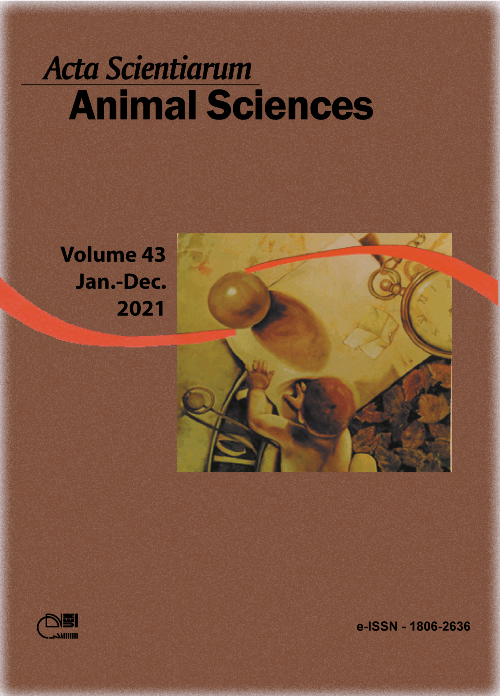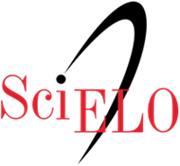Relationship between the level and the action period of fiber in diets to laying hens
Resumo
The aim of the present study was to evaluate the relationship between the level of fiber and its action period in diets to laying hens on performance and egg quality. 180 Hisex white hens (65 weeks-old) were randomly allocated to 3 groups of 60 birds each, comprising 10 replicates of six birds per treatment. The experimental design was factorial scheme considering three levels of fiber (2.50, 4.87 and 7.24%) in birds’ diets, and three action periods of this fiber (short - 21 days, medium - 56 days, and long - 105 days) in the feed. The estimates of treatments were firstly subjected to ANOVA and a subsequent Tukey test at 5%. Birds fed diets with moderate levels of fiber (4.87%) presented better (p < 0.05) performance. High levels of fiber caused a significant reduction in performance. Birds fed diets with low and moderate levels of fiber produced eggs with better (p < 0.05) quality. High levels of fiber caused a significant reduction in egg quality. The exposure of birds to diets with fiber for long-term caused a negative effect (p < 0.05) on performance, egg weight and percentage of its main structures, albumen height, yolk height, eggshell thickness, and the specific gravity.
Downloads
Referências
Amerah, A. M., Ravindran, V., & Lentle, R. G. (2009). Influence of insoluble fibre and whole wheat inclusion on the performance, digestive tract development and ileal microbiota profile of broiler chickens. British Poultry Science, 50(3), 366–375. doi: 10.1080/00071660902865901
Association of Official Analytical Chemists [AOAC]. (2016). Official methods of analysis (20th ed.). Rockville, MD: AOAC international.
Braz, N. M., Freitas, E. R., Bezerra, R. M., Cruz, C. E. B., Farias, N. N. P., Silva, N. M., ... Xavier, R. P. S. (2011). Fiber in growth ration and its effects on performance of laying hens during the growing and laying phases. Brazilian Journal of Animal Science, 40(12), 2744-2753. doi: 10.1590/S1516-35982011001200019
González-Alvarado, J. M., Jimenez-Moreno, E., González-Sanchez, D., Lazaro, R., & Mateos, G. G. (2010). Effect of inclusion of oat hulls and sugar beet pulp in the diet on productive performance and digestive traits of broilers from 1 to 42 days of age. Animal Feed Science and Technology, 162(1-2), 37-46. doi: 10.1016/j.anifeedsci.2010.08.010
Guzmán, P., Saldaña, B., Kimiaeitalab, M. V., García, J., & Mateos, G. G. (2015). Inclusion of fiber in diets for brown-egg laying pullets: Effects on growth performance and digestive tract traits from hatching to 17 weeks of age. Poultry Science, 94(11), 2722-2733. doi: 10.3382/ps/pev288
He, L. W., Meng, Q. X., Li, D. Y., Zhang, Y. W., & Ren, L. P. (2015). Influence of feeding alternative fiber sources on the gastrointestinal fermentation, digestive enzyme activities and mucosa morphology of growing Greylag geese. Poultry Science, 94, 2464-2471. doi: 10.3382/ps/pev237
Incharoen, T., & Maneechote, P. (2013). The effects of dietary whole rice hull as insoluble fiber on the flock uniformity of pullets and on the egg performance and intestinal mucosa of laying hens. American Journal of Agricultural and Biological Sciences, 8(4), 323-329. doi: 10.3844/ajabssp.2013.323.329
Jiménez-Moreno, E., Coca-Sinova, A., González-Alvarado, J. M., & Mateos, G. G. (2015). Inclusion of insoluble fiber sources in mash or pellet diets for young broilers. 1. Effects on growth performance and water intake. Poultry Science, 95(1), 41-52. doi: 10.3382/ps/pev309
Jiménez-Moreno, E., Frikha, M., Coca-Sinova, A., García, J., & Mateos, G. G. (2013). Oat hulls and sugar beet pulp for broiler diets: 1. Effects on growth performance and nutrient digestibility. Animal Feed Science and Technology, 182(1-4), 33-43. doi: 10.1016/j.anifeedsci.2013.03.011
Jiménez-Moreno, E., González-Alvarado, J. M., Coca-Sinova, A., Lázaro, R., & Mateos, G. G. (2009a). Effects of source of fibre on the development and pH of the gastrointestinal tract of broilers. Animal Feed Science and Technology, 154(1), 93-101. doi: 10.1016/j.anifeedsci.2009.06.020
Jiménez-Moreno, E., González-Alvarado, J. M., Lázaro, R., & Mateos, G. G. (2009b). Effects of type of cereal, heat processing of the cereal, and fiber inclusion in the diet on gizzard pH and nutrient utilization in broilers at different ages. Poultry Science, 88(9), 1925-1933. doi: 10.3382/ps.2009-00193
Kalmendal, R., Elwinger, K., Holm, L., & Tauson, R. (2011). High-fibre sunflower cake affects small intestinal digestion and health in broiler chickens. British Poultry Science, 52, 86-96. doi: 10.1080/00071668.2010.547843
Lima, C. P., Cunico, M. M., Miyazaki, C. M. S., Miguel, O. G., Côcco, L. C., Yamamoto, C. I. & Miguel, M. D. (2012). Conteúdo polifenólico e atividade antioxidante dos frutos da palmeira Juçara (Euterpe edulis Martius). Revista Brasileira de Plantas Medicinais, 14(2), 321-326. doi: 10.1590/S1516-05722012000200011
Longe, O. G. (1984). Effects of increasing the fibre content of a layer diet. British Poultry Science, 25, 187-193. doi: 10.1080/00071668408454857
Mateos, G. G., Jiménez-Moreno, E., Serrano, M. P., & Lázaro, R. P. (2012). Poultry response to high levels of dietary fiber sources varying in physical and chemical characteristics. Journal of Applied Poultry Research, 21(1), 156-174. doi: 10.3382/japr.2011-00477
Mohiti-Asli, M., Shivazad, M., Zaghari, M., Rezaian, M., Amin-zadeh, S., & Mateos, G. G. (2012). Effects of feeding regimen, fiber inclusion, and crude protein content of the diet on performance and egg quality and hatchability of eggs of broiler breeder hens. Poultry Science, 91(12), 3097-3106. doi: 10.3382/ps.2012-02282
Montagne, L., Pluske, J., & Hampson, D. (2003). A review of interactions between dietary fibre and the intestinal mucosa, and their consequences on digestive health in young non-ruminant animals. Animal Feed Science and Technology, 108(1-4), 95-117. doi:10.1016/s0377-8401(03)00163-9
Mtei, A. W., Abdollahi, M. R., Schreurs, N., Girish, C. K., & Ravindran, V. (2019). Dietary inclusion of fibrous ingredients and bird type influence apparent ileal digestibility of nutrients and energy utilization. Poultry Science, 98(12), 6702-6712. doi: 10.3382/ps/pez383
Rostagno, H. S., Albino, L. F. T., Hannas, M. I., Donzele, J. L., Sakomura, N. K., Costa, F. G. P., … Brito, C. O. (2017). Tabelas brasileiras para aves e suínos: composição de alimentos e exigências nutricionais. Viçosa, MG: Editora da Universidade Federal de Viçosa.
Sadeghi, A., Toghyani, M., & Gheisari, A. (2015). Effect of various fiber types and choice feeding of fiber on performance, gut development, humoral immunity, and fiber preference in broiler chicks. Poultry Science, 94(11), 2734-2743. doi: 10.3382/ps/pev292
Silva, M. A., Chaar, J. S. & Nascimento, L. R. C. (2014). Polpa de açaí: o caso da produção do pequeno produtor urbano de Manaus. Scientia Amazonia, 3(2), 65-71.
Statistical Analysis System [SAS]. (2008). SAS/STAT Software, Version 9.2. Cary, NC: SAS Institute Inc.
Svihus, B. (2011). The gizzard: function, influence of diet structure and effects on nutrient availability. World’s Poultry Science Journal, 67(2), 207-224. doi: 10.1017/S0043933911000249
Trowell, H., Southgate, D. A., Wolever, T. M., Leeds, A. R., Gassull, M. A., & Jenkins, D. J. (1976). Letter: dietary fibre refined. Lancet, 1, 967. doi: 10.1016/s0140-6736(76)92750-1
Van der Hoeven-Hangoor, E., Rademaker, C. J., Paton, N. D., Verstegen, M. W. A., & Hendriks, W. H. (2014). Evaluation of free water and water activity measurements as functional alternatives to total moisture content in broiler excreta and litter samples. Poultry Science, 93(7), 1782-1792. doi: 10.3382/ps.2013-03776
Van Soest, P. J. (1994). Nutritional ecology of the ruminant. (2nd ed.). New York, NY: Cornell University Press.
Yokhana, J. S., Parkinson, G., & Frankel, T. L. (2015). Effect of insoluble fiber supplementation applied at different ages on digestive organ weight and digestive enzymes of layer-strain poultry. Poultry Science, 95(3), 550-559. doi: 10.3382/ps/pev336
DECLARAÇÃO DE ORIGINALIDADE E DIREITOS AUTORAIS
Declaro que o presente artigo é original, não tendo sido submetido à publicação em qualquer outro periódico nacional ou internacional, quer seja em parte ou em sua totalidade.
Os direitos autorais pertencem exclusivamente aos autores. Os direitos de licenciamento utilizados pelo periódico é a licença Creative Commons Attribution 4.0 (CC BY 4.0): são permitidos o compartilhamento (cópia e distribuição do material em qualqer meio ou formato) e adaptação (remix, transformação e criação de material a partir do conteúdo assim licenciado para quaisquer fins, inclusive comerciais.
Recomenda-se a leitura desse link para maiores informações sobre o tema: fornecimento de créditos e referências de forma correta, entre outros detalhes cruciais para uso adequado do material licenciado.








































